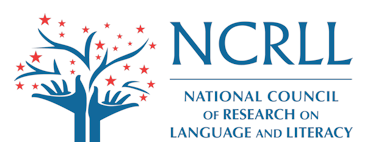 NATIONAL COUNCIL FOR RESEARCH ON LANGUAGE AND LITERACY
NATIONAL COUNCIL FOR RESEARCH ON LANGUAGE AND LITERACY
NCRLL – Sponsored Session
Friday, November 16, 2018 — 11:00 a.m. to 12:15 p.m.
NCTE Conference, Houston, TX
Title: Considering What Families Bring to Literacy Learning: What We Know and Why It Matters
Panelists: Jaime Puccioni, Pat Edwards, Tisha Lewis Ellison, Peter Smagorinsky
Session Chairs: Catherine Compton-Lilly and Gerald Campano
This panel presentation features two established scholars who have recently been awarded the NCRLL Distinguished Scholar Award: Patricia Edwards and Peter Smagorinsky. These esteemed colleagues are joined by Jaime Puccioni and Tisha Lewis Ellison, two emerging voices in the literacy field. All members of the panel will explore how parents and other family members contribute to children’s emergent literacy knowledge and experiences. Speakers will attend to not only insights related to literacy experiences in homes and communities but also on ways to build on and extended those important seeds of literacy learning. Time will be available for questions and conversation following the presentations.
Title: Examining the Associations among Preschool Teachers’ Outreach Efforts, Parental Involvement, and Children’s Reading Achievement
Jaime Puccioni
Dr. Jaime Puccioni opens the session by drawing on a theory of parental involvement proposed by Hoover-Dempsey and colleagues (2005). This work suggests that the invitations extended by educators shape parents’ school and home-based involvement, which in turn, influences children’s outcomes. Using nationally representative data from the Early Childhood Longitudinal Study – Birth cohort (N ≈ 3,200), a structural equation model was estimated to examine relationships among preschool teachers’ outreach efforts, parental involvement, and children’s reading achievement during the transition to elementary school. Results indicate that parent’s perceptions of preschool teachers’ outreach efforts are positively associated with home-based parental involvement, which in turn, is positively associated with children’s reading achievement in kindergarten. More specifically, the findings suggest that parents who have more positive perceptions about preschool teachers’ outreach efforts report engaging in more home-based involvement practices, which in turn, has a positive impact on children’s early reading achievement. These findings have important practical implications for educators who aim to encourage parental involvement that supports children’s early literacy development.
Title: Connecting Home and School Literacies in the Classroom: An Intervention Study
Pat Edwards
Connecting home and school literacies in the classroom is critical to improving the educational outcomes for all children. A design experiment methodology was employed to focus on relevant factors for the successful use of parent stories as a space for shaping teachers’ perceptions about students’ home language and literacy experiences and teachers’ enactment of these perceptions within literacy planning and instruction. Analysis of the data resulted in four central findings. First, the elementary teacher participants experienced intense pressure to implement basal curricula with fidelity. Second, participants experienced tension between complying with their district’s mandated use of basal curricula and enacting pedagogical practices that built upon students’ home literacies. Third, the parent stories model provided a space for teacher participants to engage in meaningful conversations with parents so that they could adapt basal curricula to incorporate students’ home literacies. Fourth, participants altered how they described when they taught literacy, moving from constrained instructional times to an integrated literacy model.
Title: Supporting Literacy Learning at Home between an African American Father with his Children
Tisha Lewis Ellison
Most students learn in spaces where creativity, choice, imagination, and agency relate to how they view their worlds and experiences. One way to explore student learning, and more specifically African American student learning, is to consider literacy experiences that occur among family members. Examining literacy learning, within the context of African American youth and families, is significant when imagining ways to challenge cultural-deficit viewpoints that have dominated research concerning their rich and complex literacy practices. Using critical sociocultural theory to focus on the literacy practices with attention to identity, power, and agency, and photo-elicitation as a visual and multimodal research method to use photos to evoke memories and feelings about an activity, this presentation examines how an African American father and his children used a do-it yourself video to create Christmas ball lights and the effects this project had on their learning together. When educators recognize the educational value that rests in home literacy practices of youth and their parents, we can consider possibilities for improving African American students’ literacy outcomes, inform practices and programs, create rigor in research, and transform polices.
Title: The Community Context for Literacies and their Practice: Mural Art in Guadalajara as First Literacies
Peter Smagorinsky
Finally, Dr. Smagorinsky will explore Guadalajaran mural culture. Through his presentation and analysis of cultural images, Dr. Smagorinsky will make a case for image as narrative. This presentation highlights the “First Literacies” that many children bring to formal literacy learning, i.e., multimodal literacies produced through material, rather than digital, means. This term was developed by the speaker to account for the ways in which graphic images provided the first means of telling stories, representing culture, and providing historical icons for continuity across generations, beginning with cave wall drawings from 40,000 years ago, extending through both European and Aztec cultures, and still vital in mural and other artistic forms in Mesoamerica, the US, and other societies that use material means for expressive purposes. The speaker’s work with the University of Guadalajara and street excursions in the city provide the basis for the talk, historicized with attention to the role of multimodal material texts historically and in the present.
Follow our blog on next steps from this NCRLL session.
Designed by Elegant Themes | Powered by WordPress


